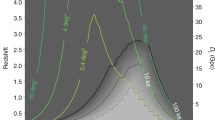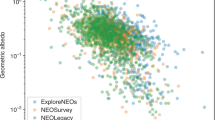Abstract
IN a recent review article, Donahue1 has discussed the various hypotheses put forward to explain the observed Lyman-α radiation2,3 in the night sky. The observed radiation is apparently solar Lyman-α radiation scattered by neutral hydrogen. There are three hypotheses concerning the location of the hydrogen: namely, the interplanetary hypothesis3; the geocorona hypothesis4,5 (origin in a thin, essentially spherical shell with multiple scattering important); and the geocoma hypothesis6,7 (origin in a comet-like distribution at distances greater than some 5–10 RE single scattering important). It is felt that the review1 is generally not unfavourable to the geocoma hypothesis, but several important points were raised by Donahue. The purpose of this communication is to discuss briefly the general status of the geocoma hypothesis in the light of recent observational and theoretical evidence and, in particular, to discuss the problems noted by Donahue.
This is a preview of subscription content, access via your institution
Access options
Subscribe to this journal
Receive 51 print issues and online access
$199.00 per year
only $3.90 per issue
Buy this article
- Purchase on Springer Link
- Instant access to full article PDF
Prices may be subject to local taxes which are calculated during checkout
Similar content being viewed by others
References
Donahue, T. M., Space Sci. Rev. (in the press).
Kupperian, J. E., Byram, E. T., Chubb, T. A., and Friedman, H., Ann. Geophys., 14, 329 (1958).
Kupperian, J. E., Byram, E. T., Chubb, T. A., and Friedman, H., Planet. Space Sci., 1, 7 (1959).
Johnson, F. S., and Fish, R. A., Astrophys. J., 131, 502 (1960).
Johnson, F. S., Astrophys. J., 133, 701 (1961).
Brandt, J. C., Astrophys. J., 134, 394 (1961).
Brandt, J. C., Space Research, 2, edit. by van de Hulst, H. C., de Jager, C., and Moore, A. F., 624 (North-Holland Pub. Co., Amsterdam, 1961).
Thomas, G., and Donahue, T. M. (to be published.)
Beard, D. B., J. Geophys. Res., 65, 3559 (1961).
Prokudina, V. S., Spectral, Electrophotometrical, and Radar Researches of Auroral and Airglow, 43 (Acad. Sci., Moscow, 1957).
Brandt, J. C., and Chamberlain, J. W., Astrophys. J., 130, 670 (1959).
Morton, D. C., and Widing, K. G., Astrophys. J., 133, 596 (1961).
Hinteregger, H. E., J. Geophys. Res., 66, 2367 (1961).
Brandt, J. C., Astrophys. J., 133, 688 (1961).
Chubb, T. A., Friedman, M., Kreplin, R. W., and Mange, P., Les spectres des astres dans l'ultra-violet lointain, 437 (Institut d'Astrophysique, Liège, 1961).
Brandt, J. C., Planet. Space Sci., 9, 67 (1962).
Kreplin, R. W., Friedman, H., Chubb, T. A., and Mange, P., Planet Space Sci., 9, 68 (1962).
Dufay, J., Dufay, M., and Huu-Doan, Niguyen, C.R., Acad. Sci., Paris, 253, 974 (1961).
Friedman, H. (private communication, rocket experiment).
Author information
Authors and Affiliations
Rights and permissions
About this article
Cite this article
BRANDT, J. The Lyman-α Problem and the Geocoma Hypothesis. Nature 195, 894–895 (1962). https://doi.org/10.1038/195894b0
Issue Date:
DOI: https://doi.org/10.1038/195894b0
Comments
By submitting a comment you agree to abide by our Terms and Community Guidelines. If you find something abusive or that does not comply with our terms or guidelines please flag it as inappropriate.



